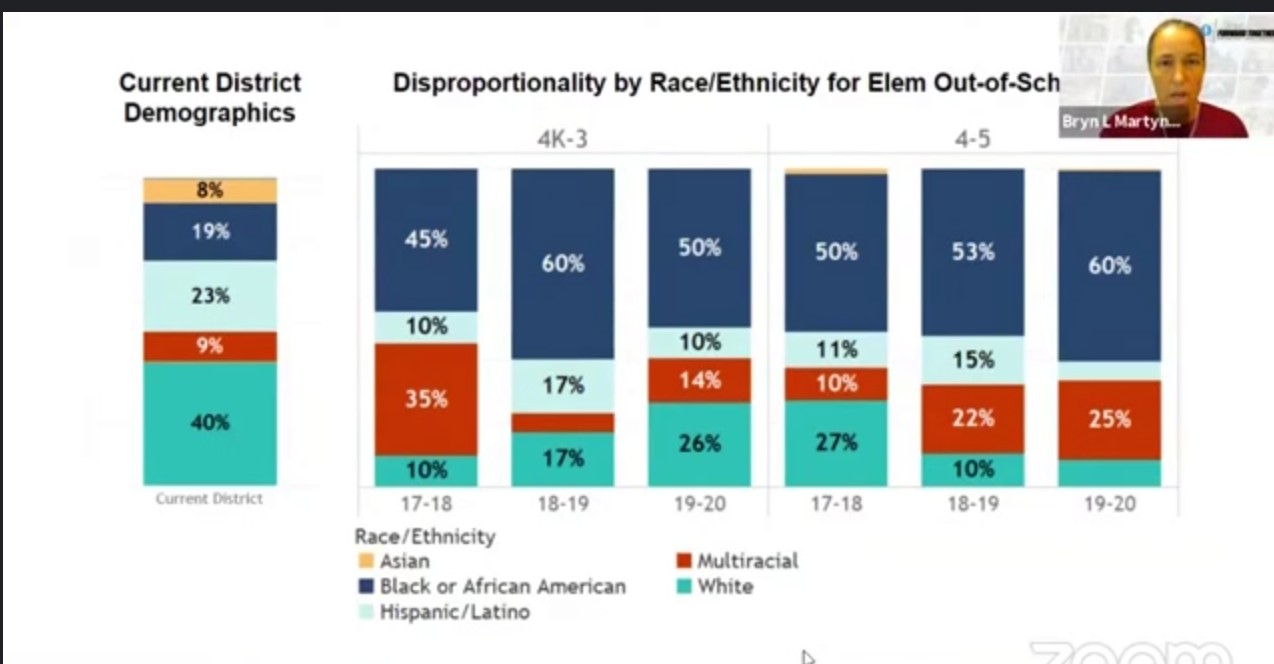
Elementary students in Madison will no longer face out-of-school suspension under a proposal expected to be approved by the school board later this month.
Administrators presented the plan to the board’s Instruction Work Group on Monday night, citing racial disparities in the use of suspensions, the negative impact of suspensions on students, and the fact that suspensions don’t seem to improve behavior.
Bryn Martyna, the district’s discipline coordinator, said the number of out-of-school suspensions in 4k through fifth grade were already lower after the current Behavioral Education Plan (BEP) replaced the former Student Code of Conduct in 2014, but that Black and Latino students and students with disabilities made up a disproportionate number of the suspensions.
For example, Black students make up 15 percent of the 4K-5 student population, but made up 60 percent of the 132 suspensions of fourth and fifth graders in the 2019-20 school year.


“We want to remember each one of these numbers represents a child in our district. And … we have a commitment as a district to make that child feel safe and a sense of belonging in our schools. These are disparities that exist, that persist, and they’re intolerable,” she said. “When we see this level of disproportionality, we know we have to pull together to make a change. We have to lean forward together to do things differently and ensure our youngest students, and our youngest students who’ve been identified with disabilities, that they’re able to access the support they need.”
Leia Esser, the district’s director of student physical, mental, and behavioral health, noted that the BEP explicitly states a number of goals, the third of which is to reduce disparities in out-of-school suspensions.
“By proposing a moratorium on the use of out-of-school suspensions in grades 4k-5, we’re effectively ‘achieving’ Goal Three of the behavior education plan, eliminating disproportionality in the use of out-of-school suspensions at the elementary level,” she said. “However, imposing a moratorium on the use of out-of-school suspensions is symbolic and only a first step. As a district we must lead with our values interrogating and dismantling racist systems and recommitting to the cultivation of welcoming, safe, and just school communities. Ultimately, we cannot be excellent until we are equitable, and to be either our black scholars and scholars with IDPs must belong in a community of learners.”
The administration’s proposal does not specifically outline alternatives to suspension, but Esser said building principals are largely in favor of the moratorium and that staff would continue to work to ensure principals and teachers have the necessary resources and support to enforce discipline humanely.
Superintendent Carlton Jenkins said the moratorium is one step toward a larger mission.
“We’re starting now with the moratorium on suspension, pre-K through five, but it’s also leading us into the whole idea around humanity,” he said.
Chief of Elementary Schools Carlettra Stanford said the moratorium is part of a “mind shift” to make the district more actively anti-racist.
“We know what our data says about suspension. We know the students that are being impacted, and we know that we have to do better if we are trying to be an anti-racist and striving to be an anti-racist organization,” she said. “We have to change our mindset.”
Board members were generally supportive of the change in policy and are expected to approve an amendment to the BEP at the board’s September 27 meeting.’
“I’m not going to say there aren’t behaviors that are problematic in a classroom or in a group setting. Little kids make mistakes. That’s part of learning,” said board member Maia Pearson. “But … this direction allows for us to rethink how we respond as adults, and to cater our responses to our students in ways that are age appropriate for young people. So I fully support this.”
“I will say in public, what I have asked the team when they brought this conversation on our draft format in preparation for this meeting is to say, ‘Why aren’t we doing moratorium K through 12?’” said board member Ananda Mirilli. “So I hope that we get there sometime soon. This is an extremely important step to achieve the goal that we are setting ourselves in order to be anti-racist.”
The moratorium is “part of our transition to restorative, holistic justice,” board member Savion Castro said in an interview Tuesday. “I think it’s important that we hold people accountable for behavior, but we can do that while also keeping their humanity in mind as well.”



